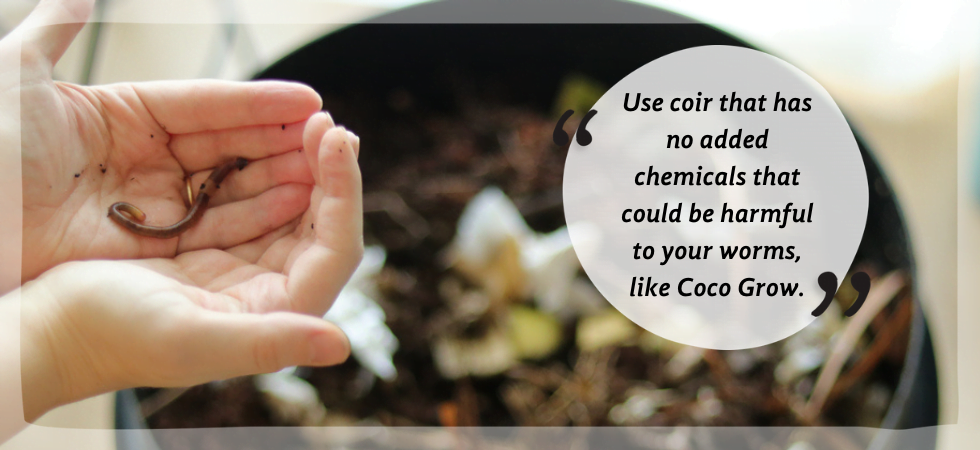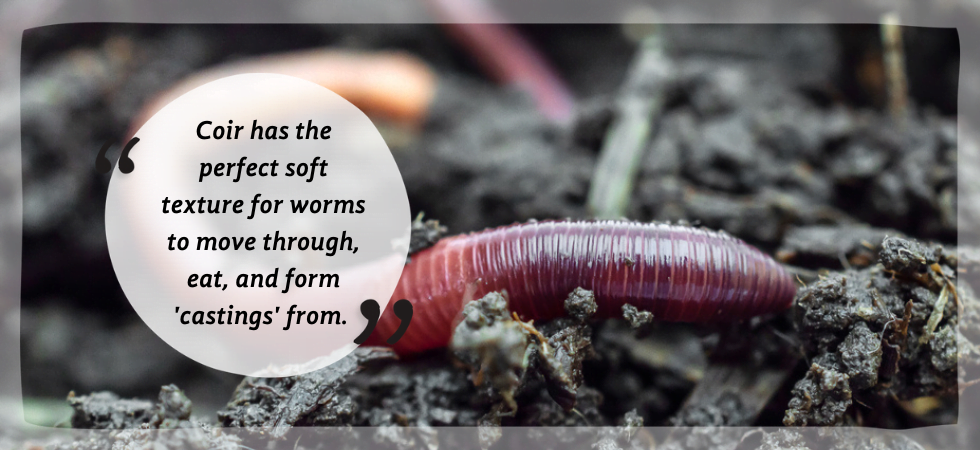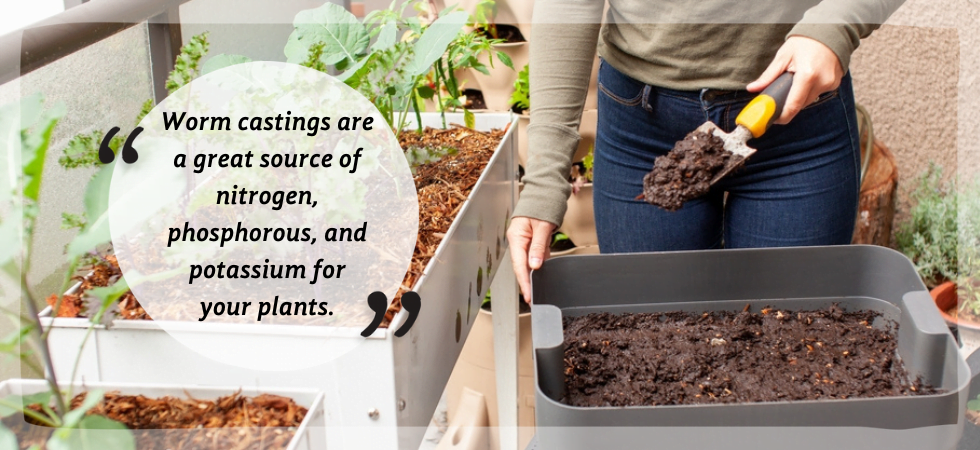Coco coir for worm bins
If you’ve invested in a composting wormery, you’re on to a winner. These wriggling little workers produce fantastic organic compost! But it’s vital to keep them happy. Using coco coir for worm bins is just the ticket.

Will worms eat coconut coir?
Absolutely! Worms love to eat coconut coir. And live in it. Technically the coir is their ‘bedding’, but worms don’t really distinguish between added food and their equivalent of a mattress. Like The Very Hungry Caterpillar, they just keep chomping!
Pros of coconut coir
• 100% natural, non-toxic and made from a sustainable source
• Doesn’t contain any animal products
• pH neutral
• Contains naturally occurring potassium, which is great for flower development
• Retains moisture, helping to keep the inside of your worm bin the right level of damp for your guests
• Is light and airy, allowing your worms to move easily through the air pockets
• Rich in carbon which helps balance out nitrogen-rich food waste
• Has a soft texture for worms to move through
Best coco coir for worms
Our Coco Grow blend comes in coir blocks, each of which produces 9 litres of compost, making it perfect for worm bins. Make sure you hydrate the coir before putting it in your worm bin, but it shouldn’t be sopping wet. Think damp sponge.
Also don’t worry about washing out salts from our coir. Our coconut husks are soaked (or retted) for 6 – 12 months to remove any surplus salt from the pith. In fact, it is triple washed, making one of the best quality coirs available.
Will worms decompose coconut coir?
Yes, worms will easily decompose coconut coir. Or to be more specific, eat it up and then excrete it.
Once they’ve eaten and breed in an area, worms tend to move on to find fresh food and bedding.

How to maintain a worm bin
Like any kind of composting, a wormery needs attention. Check your worm bin every few days to see if it needs more bedding or more food.
The worms used in wormeries are different to the ones in our soil. You need surface-dwelling worms, which eat up to half their own body weight every day.
The Goldilocks balance
Worms don’t like it too hot or too cold. Between 18 – 25 degrees C is perfect. A dry, shady spot is best which doesn’t get the sun. But also won’t drop below 5 degrees C.
Keeping your wormery inside is probably your best bet, such as in a basement, kitchen, utility room or garage. This will discourage birds and moles from trying to eat your worms.
What’s on the menu?
Worms love:
• Vegetables
• Fruit – but not citrus fruit
• Coffee grounds and tea leaves
• Edible garden waste, weeds and flowers – chop them up finely to help the worms digest this waste more easily
Don’t give them:
• Animal products
• Dairy products
• Anything which includes oils
• Onions, leeks, shallots or garlic
• Dog and cat poo
• Any food they’ve left in the past – they obviously don’t like it!
• Fruit or vegetable scraps with seeds as they could germinate within your worm bin
Tip: the best way to add food is to first dig a small hole with a trowel. Then add the food and cover it with damp coir or newspaper. This will discourage fruit flies.
Treacherous ‘tea’
Is a lot of ‘worm tea’ draining from your worm bin? This probably means it’s a bit too damp inside. Try adding dry, shredded paper to the mix.
You also need to check the worms are still alive. Use a hand fork to gently turn over the mixture, to make sure they’re healthy.
Can I use worm castings in coir?
Absolutely! Worm castings are the end product of eating and excreting waste = worm poo. It’s amazing stuff, full of the nitrogen, phosphorus and potassium plants need to thrive as well as micronutrients. The liquid fertiliser you can buy, but is very expensive, is a synthesised version of liquid worm castings in effect. Worms create a substance so well broken down, that plants just soak the nutrients up instantly when you add water.
By mixing worm castings into your coir compost, you add a valuable source of nutrients. This is particularly useful in our neutral, non-fertilised Coco Grow coir. They also contain microbes that boost plant growth and help fight off disease.

Humic acid bonus
Did you know worm castings contain humic acid? This dissolves organic materials, which helps stimulate root growth and nutrient uptake so plants grow stronger and bigger.
Tips from the ‘Green Gardeners Guild’ online advice library
On the lookout for more tips and hints? Our blogs are packed with advice:
• How is coco compost made?
• How to recycle coco coir
• Your own recycled compost – done right!
Have you used coco coir for worm bins?
We would love to see how your wriggly garden helpers have got on with our coco coir!
Please post your pictures and tag @cocoandcoir on Instagram. We’ll credit you for any images we use and you’ll also be in with a chance to win some Coco & Coir goodies for your sustainable garden.










